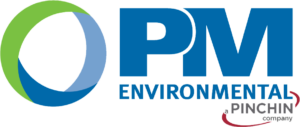After the Shutdown: Back to Business as Not-So-Usual
As COVID-19 related restrictions are lifted and economic activity resumes, property managers and developers are looking for guidance to transition swiftly and safely to a ‘new normal’. PM Environmental specialists share insights about how to reopen a facility or restart the due diligence process. They also share PM’s roadmap for guarding the health and safety of our employees and customers.
When states began issuing stay-at-home orders in March, environmental risk management was among the services deemed ‘essential’. That has allowed PM Environmental to remain open and available to clients throughout the COVID-19 shutdown.
Statewide stay-at-home orders are now expiring, and the economy is reopening. But for PM’s customers and our team members, ‘open for business’ is anything but ‘business as usual’. Many of the protocols and procedures we rely on have changed to accommodate this new era of social distancing. At the same time, the partners with whom we interface to get the job done – federal, state, and local agencies and lenders – are also adapting to meet their own unique challenges.
Reopening a Shuttered Facility
Whether restarting an idled manufacturing line or transitioning staff back to an office from a ‘virtual’ environment, managers need tools and advice to reopen with confidence. “While our services do not include testing for the presence of the coronavirus or disinfecting facilities, we can be a resource for sharing ideas and best practices,” said Jon Balsamo, PM’s National Manager of Industrial Hygiene Services. “We want to do all we can to help our clients bring their properties back to full operation efficiently and responsibly.”
Balsamo, a member of the Building Operators and Maintenance Association International (BOMA), suggests customers review the information published by the organization in response to COVID-19. “I highly recommend BOMA’s guidance document, Getting Back to Work: Preparing Buildings for Re-Entry Amid COVID-19, to help managers think through the issues related to reopening,” he said. “It covers everything from personal protective equipment, to social distancing in shared spaces, to security and access policies.”
Since the coronavirus can spread through the air, issues of indoor air quality and air handling are more important than ever. In addition to stressing the importance of regular HVAC maintenance, Balsamo encourages building maintenance professionals to review the COVID-19 related technical resources published by the American Society of Heating, Refrigerating, and Air-Conditioning Engineers (ASHRAE). “As the leading advocacy organization for the HVAC industry, there’s no better resource for evidence-based guidance than ASHRAE.”
Resuming the Due Diligence Process
The COVID-19 crisis did not spare the commercial real estate market. Many new developments, redevelopment projects and financing deals were stopped in their tracks, including due diligence processes like Phase 1 and Phase 2 Environmental Site Assessments (ESAs).
“For all of us working to restart this corner of the economy, the watchword needs to be patience,” said Steve Price, CHMM. A Principal and Vice President at PM, Price specializes in transactional due diligence. “As anxious as everyone is to pick up where we left off and make up for lost time, the reality is that there will be logjams at every step in the process. Project timelines should be revised to reflect that.”
Price outlines four challenges he already sees resulting in delays:
Access to properties – Collecting samples and conducting inspections and walk-throughs are vital to due diligence, and that means physically visiting sites. That work won’t resume until facilities are comfortable reopening their doors to vendors like PM.
Access to records – Another component of due diligence is a careful review of historical records, archived at municipal offices and governmental agencies, to understand past activity and potential contamination on a site. This in-person work has not been possible during the shutdown. “While these offices have been closed,” explained Price, “there has also been no one to respond to the FOIA (Freedom of Information Act) requests we must often file in order to gain access to these documents.”
“While some consultants might attempt to move forward without the information,” he continued, “PM’s approach to ESAs is far more thorough and comprehensive. In the absence of this data, publishing a final report could result in a ‘significant data gap,’ a data failure that hinders the environmental professional’s ability to identify a Recognized Environmental Condition (REC).
Outdated information – “No one wants to revisit work already completed,” Price admitted. “But it may be that lenders or regulators will no longer rely on data gathered or conclusions drawn several months ago. When that’s the case, customers must factor in additional time and cost to compile updated information.”
Lender backlogs – Most lenders were forced to limit their commercial lending services during the shutdown. That meant placing many loan transactions and development projects on hold. “Compounding the problem is the backlog created by banks redirecting personnel and resources to facilitate federal COVID-19 relief efforts like the Paycheck Protection Program (PPP) and the Small Business Association (SBA) Debt Relief Program,” Price said. “Once they dig out from that, they can refocus on projects and loans already in the pipeline, and then return to evaluating new projects.”
The irony of the ‘new normal’ isn’t lost on Price and Balsamo. “A year ago, our biggest challenge was keeping up with the growing demand for our services,” they said. “Now that we have plenty of available talent to turn around projects, the challenge is gaining timely access to properties, documents and decision-makers.”
Unwavering Quality and Service for Unprecedented Times
“When it comes to guarding the health and safety of workers and customers in the post-pandemic era, PM hopes to lead by example,” said Balsamo. “We’ve instituted detailed protocols to guide our work in the office and on job sites.” The protocols cover the use of personal protection equipment, sanitizing procedures, daily staff health screenings, precautions for conducting interior inspections, and options for staff to work remotely.
“While our approach has obviously changed, the quality of our work hasn’t,” added Price. “Clients can be confident that PM will continue to deliver the most reliable, actionable information available to guide their environmental risk management decision-making.”



